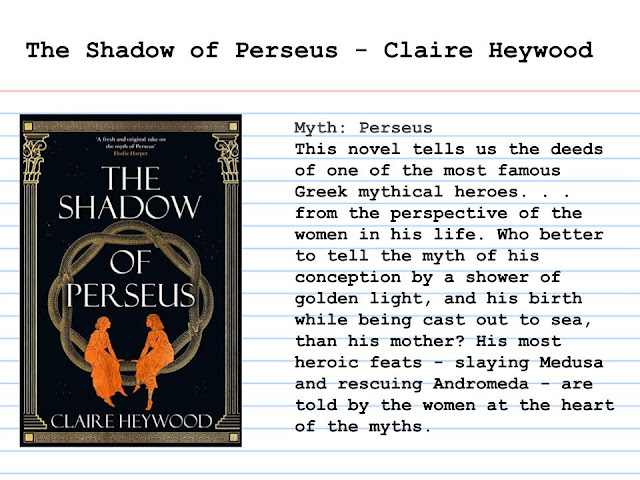In my PhD thesis, I have a chapter called Mythic Masculinities, which considers how contemporary female authors adapt the male heroes of Greek myth, with a focus on how they engage with modern theories of masculinity. In particular, this chapter asks what the specific value might be of analysing mythic men with reference to modern theories of masculinity. It pays particular attention to how ideas of heroism, so prevalent in the Greek mythic context, have been scrutinised, as well as transformed, satirised, humiliated, and exposed, generating narratives that, while set in the ancient world, stage and interrogate many feminist concerns with modern masculinity. These concerns include the emotional toll that patriarchy takes on men, the gender-based violence that women suffer at the hands of men, and the inexorable connection between normalised rape culture and misogynistic violence.
When adapting mythic men for modern audiences, the authors must ask: can the actions of these heroes be reconciled with modern morals?
I cannot emphasise enough how much I wish I could have included The Shadow of Perseus by Claire Heywood in this chapter.
The novel offers us a panoramic view of Perseus, from the perspective of the women closest to him. We hear about his conception and his early life from his mother; his most famous deed — killing Medusa — from Medusa herself; and we hear princess Andromeda’s version of his slaying of the sea serpent and securing her hand in marriage.
Suffice it to say that this novel takes to a whole new level the idea that we should be skeptical of heroic men, and the ways that these modern retellings can interrogate the patriarchy and misogyny at play in the ancient myths.
In other words: Perseus is full of shit.
Since Hélène Cixous, feminists have revisited and rewritten the Medusa myth, transforming her in various ways from a trophy / victim. In this novel, we see equal attention and empathy paid to the other women in Perseus’ orbit, as we get to hear the testimonies of Danaë and Andromeda.
The novel goes as far as to suggest that maybe helpless princesses aren't so helpless (or even princesses), and evil kings aren’t so evil; hands in marriage gladly given, and heroic missions deviously assigned, should be met with skepticism when we can’t trust the hero telling the tale.
 |
| Medusa with the Head of Perseus, Luciano Garbati (2008) |
There is a trend among contemporary feminist adaptations of Greek myths to deliberately tell the most atheistic version of a myth.
Indeed, Golden Age myths (those that tell the stories of how the world came to be and all the escapades between gods and goddesses when the world was new) are far less popular in the current retelling boom than the myths of human heroes and heroines.
One of the things that make Greek myths so unique compared to other myth systems is the sheer number of myths that are about people, rather than gods or goddesses. Even most demigods have a human step-parent in place of their divine parent. This means that many Greek myths can be told with basically no involvement of the pantheon.
Take the Trojan Saga, for example. The Iliad and Odyssey (as well as some of the Athenian plays on the subject), are comprised of two levels: on one level are the gods and goddesses playing a cosmic game of chess, and on the other are the humans, evocative pawns on the board.
Currently, there is a massive appetite for novels that retell the Trojan War, but most authors are electing to tell primarily the human parts of these stories, bringing in a 21st century* agnosticism or atheism. Part of the reason might be that we are interested in the human experiences behind the familiar stories, and part of it might be that stories within this genre walk a subtle line between literary fiction and fantasy, and perhaps there is a misconception that a godless retelling will necessarily not fall on the fantasy side of the line.
* or 5th century BCE agnosticism: a lot of our favourite Athenian playwrights and philosophers also doubted the gods’ involvement in their myths or used the myths in a way that was separate from religion. This suggests that an agnostic myth isn’t as oxymoronic as it sounds.
The Shadow of Perseus continues this trend, but it’s a bit weirder in the case of Perseus than it is in other myths.
Put simply: magic and gods play a much larger role in Perseus’ myth than they do in any other. Edith Hamilton notes that Perseus’ mythos is ‘a story on the level of a fairy story’: Athena and Hermes are fairy godmothers, the bag and winged shoes are magical artefacts, and the story follows the triplicate trials of a fairytale (Hamilton 1942: 196). Zeus impregnates Danaë in the form of a shower of golden light, Perseus’ main trial is to kill a Gorgon with snakes for hair who can turn men to stone with a single look, and he meets his wife rescuing her from a sea monster! Magic abounds in Perseus’ mythos.
So when The Shadow of Perseus tells a deliberately atheist version of the myth, it might be a bit jarring. Or it might be an excellent exemplar of the current trends within this proliferating genre. It might even be an example of the creative choices that adapting authors have to make when writing a mythic retelling, which is particularly interesting within the current context of the immense popularity of this literary trend.
Or it might just be an excuse for me to do a deep-dive into a really specific facet of this genre.
Claire Heywood also wrote Daughters of Sparta, a retelling of the myths of Helen and Clytemnestra. I wrote about it as part of The Shelbiad’s Solving the Problem of Helen series and in my analysis of modern retellings of Clytemnestra. Clytemnestra was also the focus of the last instalment of The Shelbiad’s Summer Book Club!
***
If you wish to submit a picture showing the books in your summery locations (or ironically dreary locations), you can send them via email (sjediting7@gmail.com), or via Twitter DMs / mentions.


Yes! Thank you for this post which expresses my own misgivings about this retelling better than I could myself. I really missed the gods and goddesses in this story, which felt a bit flat without them. I was also itching for Perseus to have some redeeming quality and for the female characters to have the occasional flaw or just a bit more…character? Taking out all the supernatural elements makes it hard to tell the story in any way other than (as you put it) “Perseus is full of shit,” which sets you up for a good vs bad/right vs wrong story, which is kind of the opposite of most convincingly human tales.
ReplyDelete